Importance of Grout Cleaning
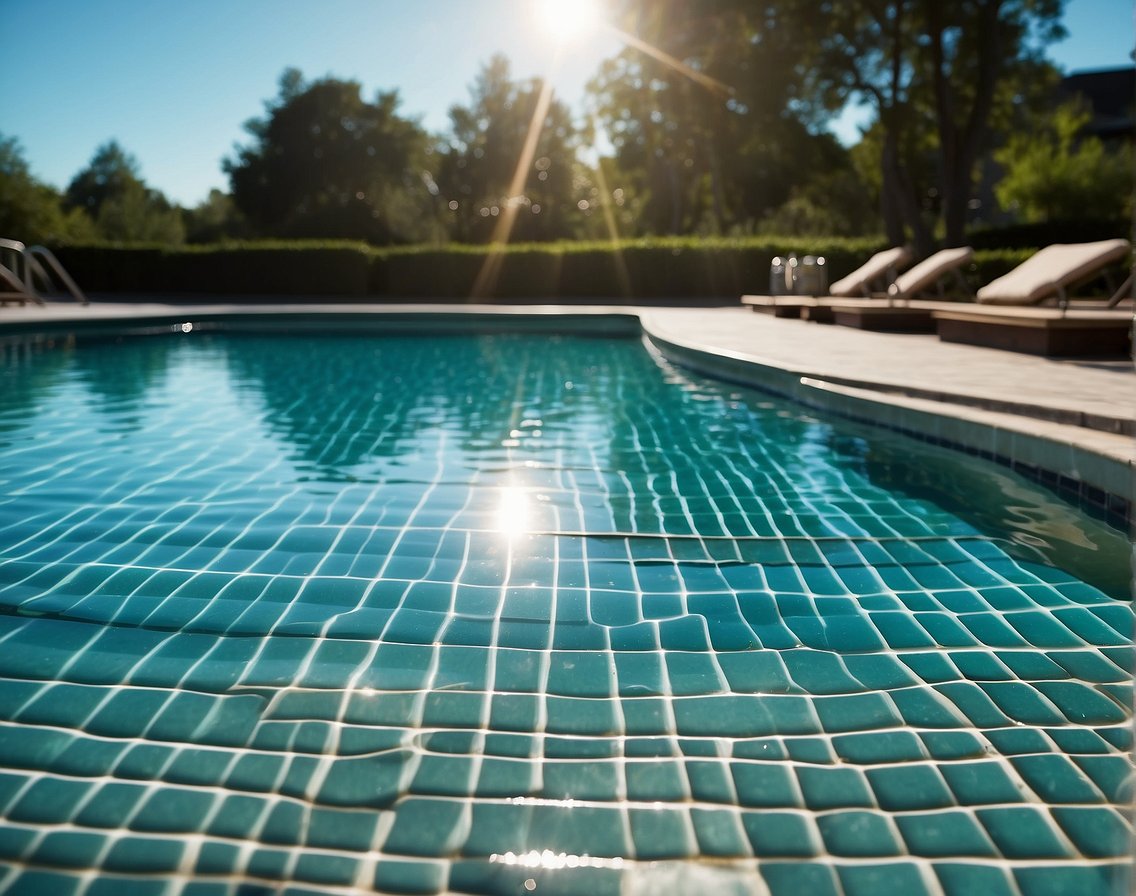
In maintaining pool aesthetics, we recognize the significant role grout plays in the overall appearance. Grout forms the spaces between tiles, and when it becomes stained or discolored, it diminishes the surface’s aesthetic appeal. Grout cleaning is essential for several reasons:
- Appearance: Clean grout enhances the beauty of pool tiles, making the pool area more inviting.
- Maintenance: Regular cleaning prolongs the lifespan of grout, warding off the need for costly repairs.
- Cleanliness: Removing dirt and debris from grout ensures a sanitary environment.
By addressing stains and discoloration, we ensure that the pool’s appearance reflects our commitment to excellence. The process of grout cleaning involves:
- Inspection: Identifying the type of stains and choosing an appropriate grout cleaner.
- Application: Applying the cleaner systematically, ensuring coverage of all affected areas.
| Step | Description |
|---|---|
| Inspection | Assess grout lines for specific cleaning needs. |
| Application | Utilize specialized grout cleaner for treatment. |
Through diligent maintenance and stain resistance efforts, we improve the pool’s overall aesthetic appeal. We use specialized grout cleaners designed for pools, which not only clean but also protect the grout from future discoloration. Remember, the cleanliness of grout is not only about aesthetics but also about the longevity and quality of your pool tiles.
Choosing the Right Cleaning Methods and Tools
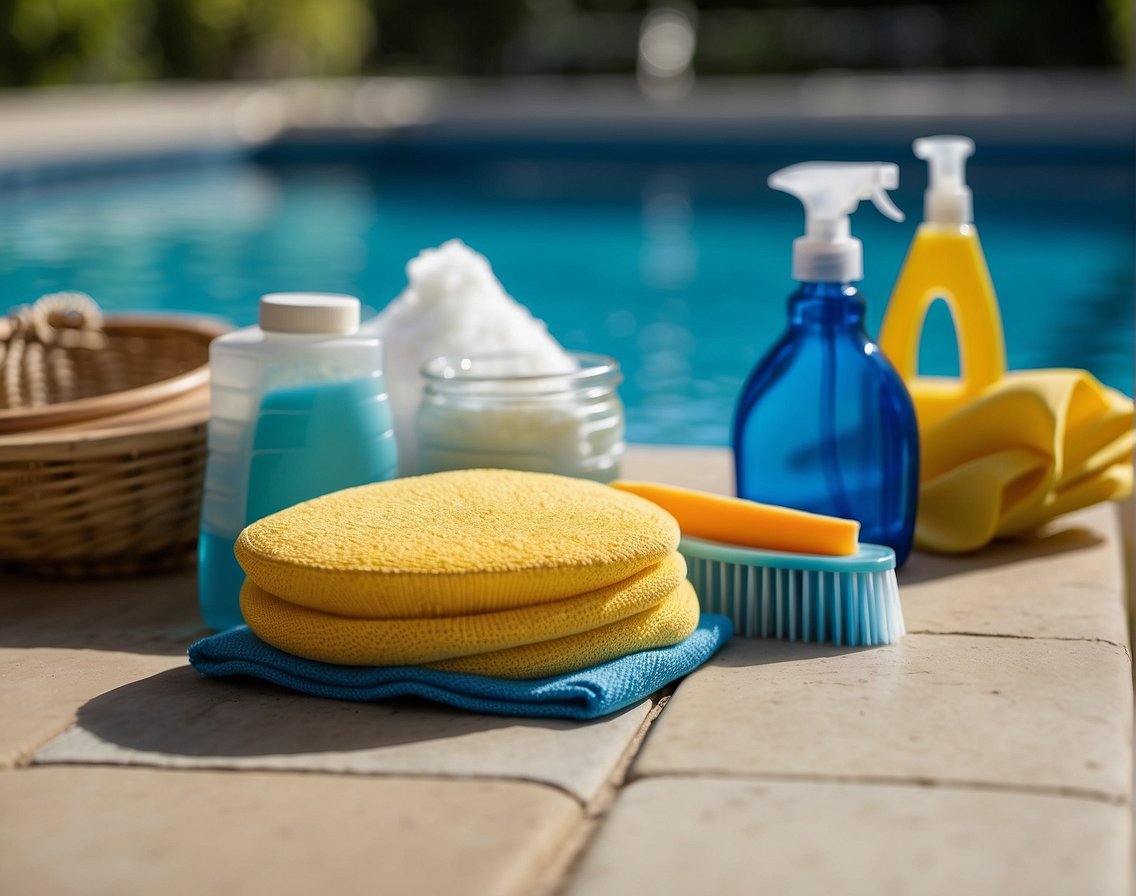
When maintaining your pool’s aesthetic integrity, grout cleaning emerges as a vital task. We emphasize a strategy that removes mold, algae, grime, and mildew without damaging the grout or tiles.
Essential Tools and Materials:
- Grout Cleaner: Select non-abrasive and suitable for the specific type of grout.
- Grout Sealer: Post-cleaning, a good sealer can protect against future stains.
- Scrub Brush: A stiff-bristled brush is preferred for scrubbing away tough stains.
- Bucket and Sponge: Useful for rinsing off cleaning solutions.
- Pressure Washer: Ideal for outdoor pools to efficiently clear larger grout areas.
DIY Cleaning Solutions:
- Vinegar and Water: A mixture of equal parts can address mild stains effectively.
- Baking Soda and Hydrogen Peroxide: A paste is perfect for more stubborn areas.
Steps for Effective Cleaning:
- Identify the stained areas and assess the extent of the build-up.
- Use the scrub brush to gently work in the chosen cleaning solution, paying extra attention to discolored spots.
- For extensive outdoor areas, a pressure washer can expediently remove unwanted layers.
- Rinse thoroughly with a sponge and clean water from a hose or bucket to remove any residual cleaning agent.
- Once dry, applying grout sealer can prevent quick re-soiling.
Adhering to this structured process ensures that we enhance your pool’s appeal without causing harm to the surfaces. Regular cleaning and sealing are paramount for long-lasting results.
Understanding the Properties of Grout
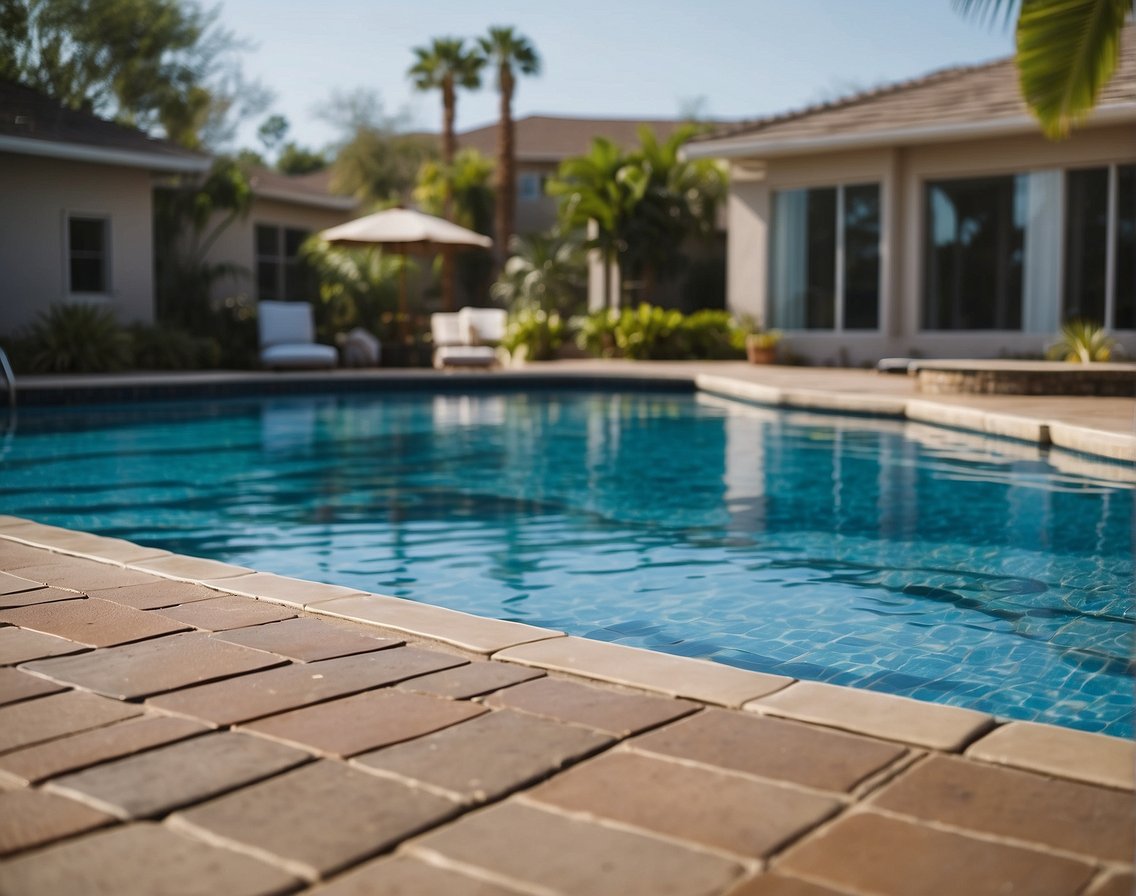
Grout plays a vital role in maintaining the aesthetic and functional integrity of pool tiles. Its properties are pivotal in preventing water damage and ensuring longevity in various climates.
Grout Composition and Types
Grout is typically a mixture of water, cement, and sand. It falls into two main categories: cementitious and non-cementitious grouts. The selection of grout type is crucial for the durability and hygiene of a swimming pool.
- Cement Grout: This common type provides good adhesion and is often used for outdoor pools. Its porous nature, however, can absorb water and chemicals, which can lead to deterioration over time.
- Epoxy Grout: Comprising resin and hardener, epoxy grout offers superior resistance to chemicals and is less porous than its cement-based counterpart, reducing the risk of water damage and health risks associated with mold and mildew.
Flexible Grout is another addition, formulated to withstand slight movements and temperature fluctuations, suitable for areas exposed to harsh weather conditions or frequent temperature changes.
Effects of Water Chemistry and Climate
The chemistry of pool water can affect grout integrity. pH levels and alkalinity must be routinely monitored and maintained, since imbalances can erode grout:
- pH and Alkalinity: Ideal pH levels should range from 7.2 to 7.8, and total alkalinity should stay between 80 to 120 ppm.
Pool grout faces challenges from the climate as well:
- Climate: Extreme temperatures, exposure to sun, and freeze-thaw cycles can cause grout to crack or flake, particularly if it is not formulated for such conditions. Flexible grout variants can accommodate some of these stresses better than traditional types.
Maintenance and Prevention Strategies
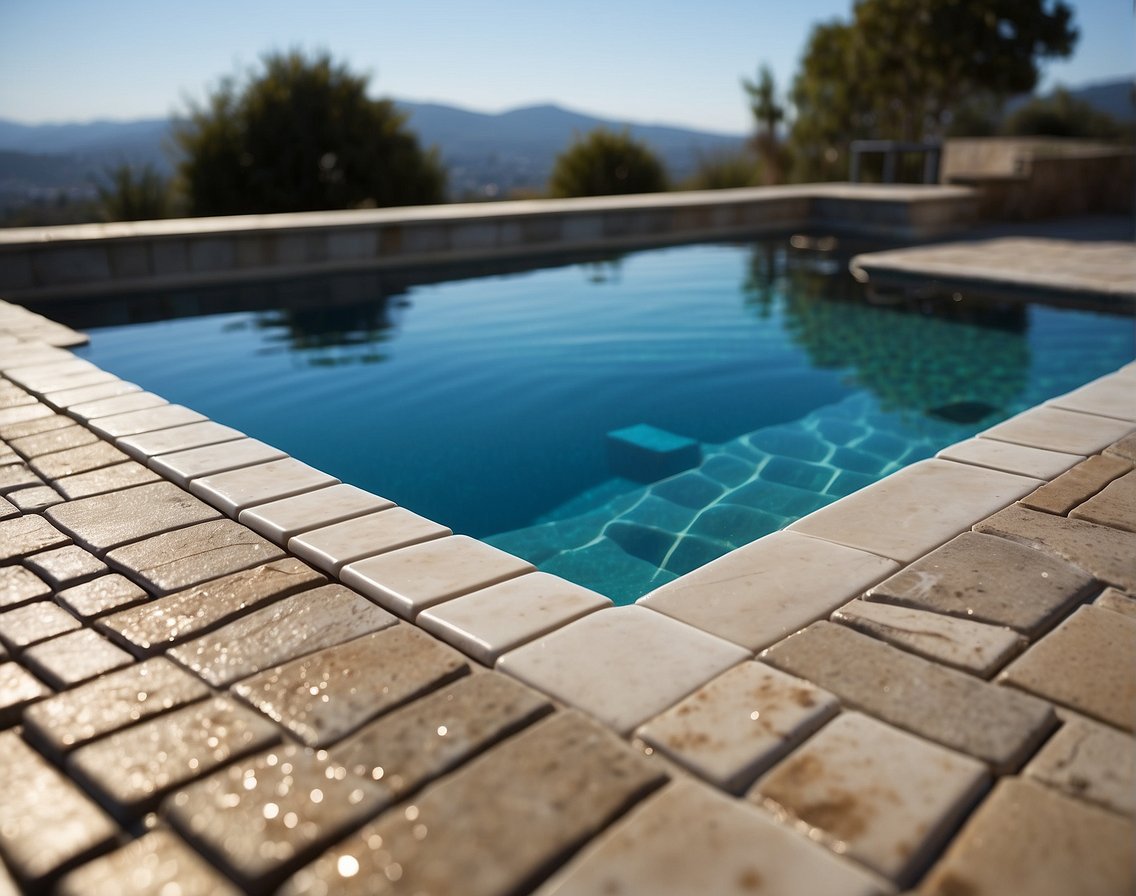
Maintaining the grout in a swimming pool is essential for both aesthetics and longevity. We must adopt a combination of routine maintenance and preventive measures to keep our pool looking its best.
Routine Grout Maintenance
Regular maintenance of pool grout is crucial to ensure its appearance and durability. We advise weekly cleaning with suitable cleaning agents to prevent the buildup of algae and stains. This should be a gentle process to avoid eroding the grout. We recommend the following steps in our maintenance routine:
- Inspect grout lines for signs of damage or discoloration.
- Clean using a stiff brush and pH-neutral cleaners designed for pool grout.
- Rinse thoroughly with clean water to remove any residue.
Following these steps can help maintain the pool’s aesthetic appeal and ensure a safe swimming environment.
Preventive Measures and Sealing
Preventive measures are paramount in reducing the frequency and cost of maintenance. Regular sealing of the grout with a quality grout sealer is advisable to provide a protective barrier against moisture and chemicals. Here are some key strategies we implement for prevention:
- Apply grout sealer annually to protect against water infiltration and chemical damage.
- Use a pool cover when the pool is not in use to minimize exposure to debris and sunlight.
- Monitor water chemistry regularly to prevent the damage caused by imbalanced pH levels.
These preventive steps help extend the life of the pool’s grout, ensuring the pool remains an enjoyable and safe space for everyone.
Enhancing Pool Design through Grout Selection
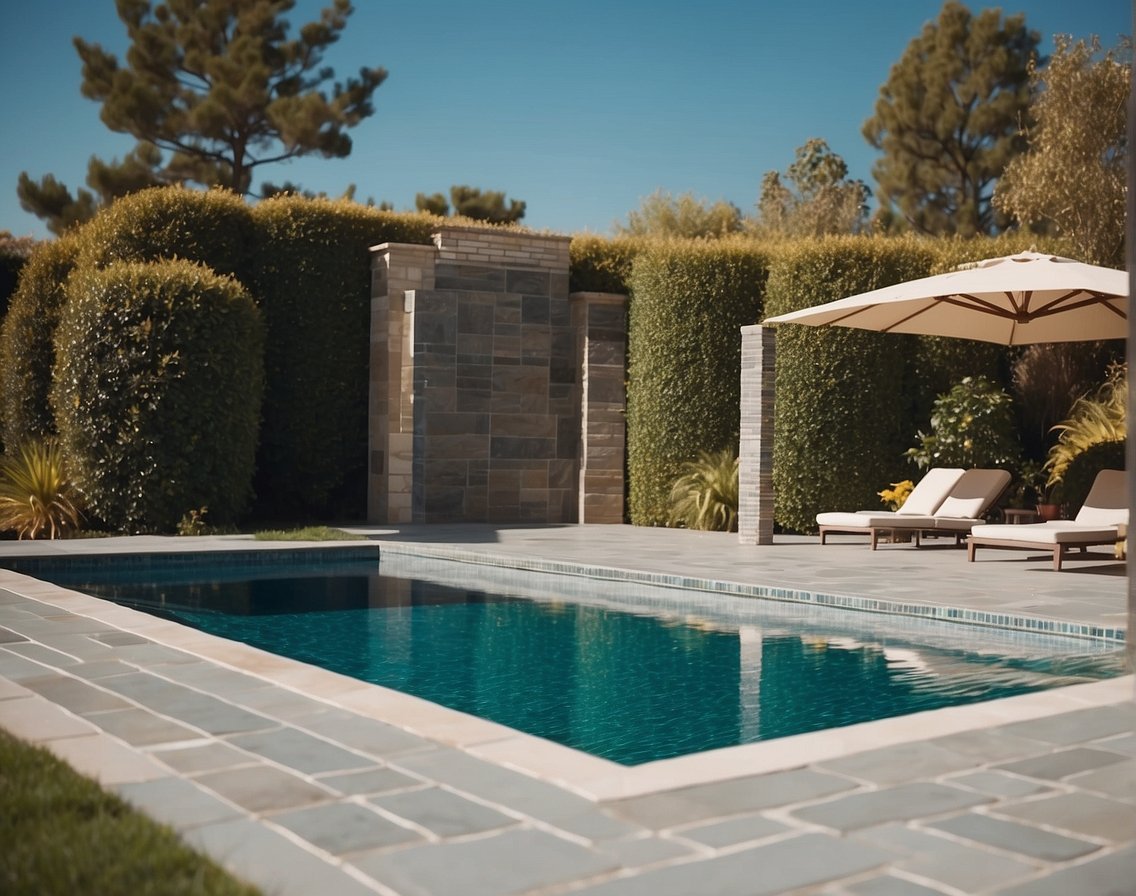
When selecting grout for our pool tiles, it is crucial to consider both aesthetics and design functionality. The grout color we choose can dramatically affect the pool’s appearance, contributing to a cohesive and inviting look. We have a plethora of color options at our disposal, each able to create a different effect in terms of style and ambiance.
- Grout Color: Selecting the right grout color can either accentuate or soften the contrast between the tiles. Darker grout can define tile edges, adding depth to the pool design, while lighter grout can provide a subtle, seamless transition between tiles.
- Aesthetics: The overall aesthetics are influenced by the harmony between the grout and the types of tiles used. Glass tiles often pair well with lighter grout to highlight their translucence, whereas natural stone tiles might benefit from grout that complements or matches their earthy tones.
Below is an outline of how different grout colors align with tile types:
| Tile Type | Grout Color | Effect |
|---|---|---|
| Glass Tiles | Light/Neutral Colors | Enhances translucence and luminance |
| Natural Stone Tiles | Darker Earth Tones | Complements natural variations |
| Bold/Colored Tiles | Contrasting Colors | Adds dynamism and vibrancy |
Grout style and personal preferences also play a role in pool design. The finish of the grout—from smooth to roughly textured—can complement our selected tile type, reinforcing the desired ambiance we intend to achieve. We focus on ensuring the style resonates with the overall design vision, creating a pool space that feels both aesthetically pleasing and true to our personal tastes.
By thoughtfully choosing our pool tile grout, we take a significant step towards enhancing the entire pool area’s look and feel. It’s not merely a functional element but a critical component of the pool’s overall design.
Frequently Asked Questions
Ensuring that the grout in your pool area is clean contributes significantly to the visual appeal of your pool. Here, we tackle some common queries relating to grout maintenance in swimming pool areas.
What are the best methods for cleaning grout on pool tiles without draining the water?
We recommend gentle scrubbing with a soft-bristled brush and a mixture of vinegar and water for mild grout stains. For more stubborn stains, oxygen bleach can be a safer alternative as it typically does not affect the water chemistry.
How can one address common swimming pool grout problems effectively?
To tackle common issues such as grout discoloration or mildew growth, we use pH-neutral cleaners followed by proper rinsing to prevent chemical imbalances in the pool water. Additionally, keeping a regular cleaning schedule helps prevent these issues from becoming severe.
What techniques are recommended for cleaning the stone around pools to enhance its appearance?
For cleaning the stone around pools, we suggest using a stone-specific cleaner to avoid damaging the material. A soft scrub brush can effectively remove dirt without being abrasive. Sealing the stone after cleaning can also prolong its pristine appearance.
Is pressure washing a safe and effective method for maintaining the aesthetics of pool tiles?
Pressure washing, when done by professionals, can be effective for cleaning pool tiles. However, we ensure that the pressure is appropriate for the tile type to avoid any damage. Techniques may vary based on tile material, and professional assessment is advised.
How does epoxy grout compare to traditional grout for use in swimming pools?
Epoxy grout is more resilient against harsh pool chemicals and less porous, reducing the likelihood of staining and bacteria growth. We find it to be a more durable option for swimming pools than traditional grout, although it can be more challenging to apply.
Why is it crucial to use the correct type of grout for pool coping and how does it affect the overall pool design?
Using the correct type of grout for pool coping is essential because it prevents water ingress behind the tiles, which can lead to damage. We choose grout that complements both the pool’s functionality and aesthetics, ensuring long-lasting beauty and integrity.
